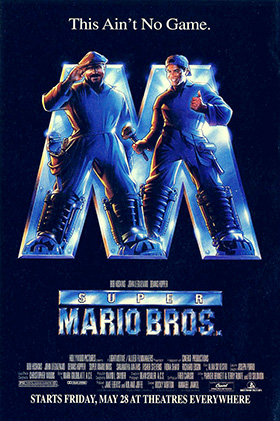Why the Super Mario Bros movie isn't that bad
It's certainly not that great, either, but I intend to play devil's advocate here, so give me a chance.
It HAD to be made, and the source material is ridiculous. It was utterly inevitable that the Super Mario Bros. movie was going to happen. It was released at the peak of Nintendo's popularity, right after the Super Nintendo hit the shelves. If Caruso, Eberts, Joffe and Weston hadn't made it, someone else would have. And it would have still sucked, because the source material is absolutely ludicrous. There's no way to turn "plumbers descend pipes, find mushroom land" into a movie that everyone will like, let alone one that anyone will like.
It was the first movie based on a video game. While the original is occasionally the best, more often than not the first version of something is riddled with flaws and gets perfected over time. Video game movies are very much the latter. While no movies based on video games can really be described as awesome, there are certainly later films that are better than this one (Mortal Kombat, Tomb Raider, Silent Hill). I suspect part of the difficulty in developing a film based on a game is that films by their nature remove the most powerful aspect of a video game -- interaction. The story is set in stone. What makes a video game movie enjoyable is how cleverly it deviates from the expected, yet how true it remains to the source material. More to come on that.
Super Mario Bros. has the bones of a good movie -- the protagonists are likeable, the villain is appropriately detestable, the love interest is attractive, the comic relief is amusing. The story on a whole is a fairy tale and a take on the hero's journey as the two Brooklyn plumbers learn of a new, hidden world, and pursue an adventure there, becoming enlightened heroes by the end of the film. The loose end in the development of this film is that the source material -- the video game -- has a pretty stupid story that doesn't translate at all to a film without some serious modification, and even then, without setting the entire thing within a character's hallucination, it's still going to be batshit crazy. I suppose it's no less batshit crazy than the universes of, say, Labyrinth or The Neverending Story, but Super Mario Bros. doesn't really pretend to be a fantasy movie. Again, this all falls back to the two points I've made above: the source material is ludicrous, and no one had made a movie based on a game before.
A lot of elements of the game's story were changed for the film, and were probably changed for the best. Thanks to Jurassic Park, which was released a year after Super Mario Bros., but was well in development while Super Mario Bros. was being filmed, there are a lot of dinosaurs and reptiles in the Mushroom Kingdom. This is presumably an extension of the Yoshi character from the video games, who is represented as a kind of midget velociraptor in a couple of scenes in the film. There's not a lot of consistency in what's a reptile and what's a fungus, though.
The old king of the mushroom kingdom was "de-evolved" from a (presumably) humanoid form into a huge fungus, while most other creatures are de-evolved into goombas (small-headed huge-bodied reptiles). There's no explanation as to why the king evolved from mushrooms. There's no explanation as to whether the king's daughter, Daisy, is also made of fungus. Nor is there any explanation as to why Daisy keeps a pet dinosaur, given that the villains are established to be reptilian. Nor is there any explanation as to why everyone else seems to de-evolve only into reptiles. Was the king the only fungus-ancestored being in the Mushroom Kingdom?
It took me a while to figure out that the old king, who has de-evolved into a pulsating pile of fungus, was simply de-evolved further than anyone who became a reptile. Presumably if one was to de-evolve a goomba, it too would become fungus. (Although goombas were evil mushrooms in the video games, if I recall). All of this then begs the further question of why is there such discrimination between reptiles and fungus if everyone's ultimately fungus anyway...
Although if that's the case, why did King Koopa de-evolve directly into green slime without passing through a fungal stage? A little bit of consistency goes such a long, long way.
There are a lot of nice elements that reflect the video game, such as the tiny wind-up Bob-omb, the Thwomp bar, the Koopahari Desert. Some insane elements of the game that would play out very poorly in live action are handled nicely, such as the jumping boots that allow Mario and Luigi to leap huge distances.
I still enjoy watching Super Mario Bros., largely because it brings back memories of the time it was released, and because it's not the worst film ever made. I forgive it because it had to be made, and I can't see any real way it could have been made better. I forgive it because it's not drowning in plot holes. I forgive it because the production values are pretty high. I forgive it because it's based on source material no one should be burdened with as a starting point. I forgive it because Bob Hoskins.
Rest in peace, Bob.


